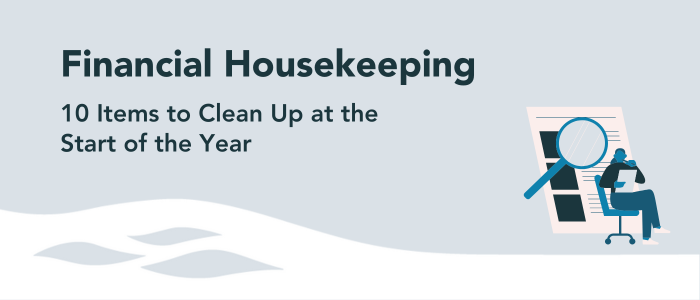Financial Housekeeping: 10 Items to Clean Up at the Start of the Year
01/15/2025

Early January is a common time for individuals and households to prepare for the year ahead by tackling financial housekeeping tasks. Performing a quick check-in on your financial life helps set your money mindset and keep your finances in order.
“When it comes to cleaning your financial house,” says Doug Weber, Senior Vice President of Commercial and Private Banking at Seattle Bank, “doing so at the beginning of the year is ideal so you can make sure everything is in order. That way, you can make an informed decision on whether any aspects need a reboot and can work with your banker or financial advisor to implement your plan.”
Here are 10 financial housekeeping tasks to help kickstart your clean up.
Look at your cash
Having cash on hand is an important part of a money management strategy, for both households and businesses. Liquid accounts give you easy access to funds that are not locked away so you can accommodate any short-term needs or goals. Now is a great time to review your checking, savings and money market accounts to make sure you’re receiving competitive rates and services that match your needs.
For businesses, keeping money in a business bank account can provide additional levels of security and offer the ability to earn interest depending on the type of account you have.
Check on your emergency fund
We’ve all experienced unexpected financial emergencies. Having an emergency fund is an essential way you can protect yourself. Check on your emergency fund and make sure it still holds enough assets to cover any unexpected expenses that may arise this year. Generally, a healthy emergency fund holds around three to six months of your living expenses. Ensure that these funds are stored in a readily accessible account such as a high-yield savings so that it allows for quick withdrawal if needed.
Update your account beneficiaries
Reviewing your designated beneficiaries is often overlooked and can have unintended consequences if forgotten. When it comes to who will inherit your assets, the beneficiary on file with the admin of the account will get the money, not who is listed on your will.
Can’t remember who you set as your beneficiary? Check all of your accounts – such as your checking and savings accounts, qualified retirement accounts like an IRA or 401(k) - to ensure your designations are up to date, working with a trusted advisor or estate planning expert if needed.
Review IRA contributions
If you’re saving for retirement, maximize your tax advantages and avoid unexpected consequences by checking once a year to see if the IRS has made any changes to the rules for individual retirement accounts (IRAs).
The IRS announced a few new changes to IRA contributions for 2025, with one of them being an increase in the amount individuals can contribute to their 401(k) plans. Consult with your tax advisor to understand your options.
Check your interest rates
Don’t let your savings sleep in a low-rate account. It’s sound practice to periodically check the interest rates that you’re earning on your certificates of deposit (CDs) and other high-yield savings accounts. Use online rate comparison sites such as CD Valet to compare CD rates offered across financial institutions to guarantee you’re receiving the best rate possible.
Check your credit score
It’s recommended to check your credit score regularly so you can monitor your financial health and identify potential fraud or unexpected errors. Each of the major credit bureaus allows consumers to access one free report each year. File a dispute if you see information that seems inaccurate.
Go paperless
There are a number of major benefits to opting out of receiving paper statements and receiving them electronically instead. In addition to the environmental benefit of cutting down on paper, typically e-statements are available sooner than mailed statements. Paperless statements also offer enhanced account security and protection from identity theft, as it decreases the risk of your statement being lost or stolen in the mail.
Finalize your charitable donations strategy
Deciding on the smartest strategy for your donations takes thoughtful planning. Review your approach for your charitable contributions for the year so you can maximize your charitable impact while maximizing available tax benefits. Consult with your financial advisor to determine the strategy that makes the most sense for you.
Review your mortgage
A mortgage review can spotlight savings opportunities and gives you the chance to jump on current market conditions. If you’re looking to buy a house or remortgage in the coming year, we recommend partnering with a mortgage professional with deep expertise and working knowledge of your local housing market.
Even if you’re not looking to buy, a mortgage review can give you confidence that you’re on track to meet your financial goals with the rate, term and payment amount that you have.
Revisit and refresh your financial plan
Conduct a financial review and identify any areas for improvement. Look over your budget to make sure it continues to meet your needs, then carve out some time to review your long term goals and update your strategy for achieving them. Refreshing your plan at the beginning of the year helps ensure that your finances are in good shape for whatever comes your way.

